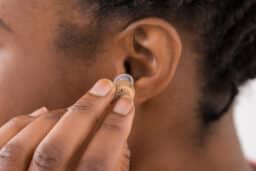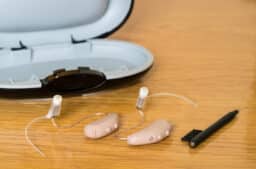Hearing Loss and Diabetes: What’s the Connection?

Approximately 11% of the U.S. population has diabetes. If you have diabetes, you’re probably familiar with its most common side effects, including fatigue, frequent urination, unexplained weight loss and blurred vision. However, one area that often gets overlooked is hearing. Research shows that even prediabetes increases the risk of hearing loss by 30%. Let’s take…
Understanding Hidden Hearing Loss

We use pure tone testing to identify most cases of hearing loss. The results are charted on an audiogram to help us understand the degree and type of hearing loss. Hidden hearing loss, on the other hand, is a little trickier to diagnose. What is Hidden Hearing Loss? Hidden hearing loss describes any hearing loss…
How Does Sound Move Through My Ears?

Whether you’re enjoying a quiet conversation at Trellis Coffee Bar or tuning in to a podcast on your daily walk, your ears are constantly processing different sounds. Let’s take a closer look at how your hearing system works and why taking care of it matters. How the Hearing System Works Your hearing system is a…
Managing Tinnitus: How Hearing Aids Can Help You Find Relief

If you’ve ever experienced a ringing or buzzing sound in your ears, you’re not alone. Tinnitus affects between 15% and 20% of people. For some, it’s a temporary annoyance. But for others, it can be a daily challenge. The Impact of Chronic Tinnitus Tinnitus is considered chronic when it lasts for three months or longer….
How to Talk to Your Child About Hearing Loss and Deaf Awareness

Helping children understand hearing loss early on is a great way to promote empathy, inclusivity and communication. Maybe a classmate wears hearing aids, or your child recently saw someone using sign language at Brookfield Park. Whatever the spark, it’s a perfect opportunity to teach your child about hearing loss. Explaining Hearing Loss Children appreciate simple,…
What to Know About Ototoxicity

Certain medications and chemicals can cause a condition known as ototoxicity, which damages the inner ear. This damage can lead to hearing loss, ringing in the ears and balance issues, impacting your ability to enjoy conversations at local favorites like The Boll Weevil Café or events at the Augusta Riverwalk. While some medications have necessary…
Tips for Helping Your Hearing Aids Stay In Place

It’s understandable to feel annoyed if your hearing aids frequently fall out or become dislodged. This often happens because of poor fit, moisture and sweat or movement. Here are some tips and tricks to make sure your devices stay remain in your ears comfortably. Make Sure They’re In Properly It’s important to make sure you’re…
Why Wearing Hearing Aids While Alone Is Essential

Hearing aids offer many benefits that go beyond helping you in conversations with friends or family or ordering a coffee at places. These devices can also be incredibly valuable during your quiet, solo moments. Physical and Emotional Benefits of Using Hearing Aids Alone Wearing hearing aids when you’re alone can bring several key benefits: Easier…
Home Safety Tips for Those with Hearing Loss

Hearing loss is a common condition, affecting around 15% of American adults. If you or a loved one is experiencing hearing loss, there are additional safety precautions that may be helpful to ensure your home remains a safe place. Safety Risks Associated with Hearing Loss People with hearing loss may face unique challenges when it…
What to Include on Your Daily Hearing Aid Maintenance Checklist

Approximately 15% of U.S. adults have hearing loss. When you live with hearing loss, your hearing aids play a vital role in supporting your overall health, so it’s essential to keep them in good condition. Much like you schedule routine maintenance for your car, such as oil changes and tune-ups, hearing aids also need regular…